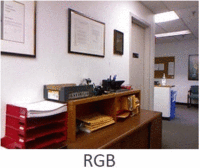Depth Estimation from a Single RGB ImageScientific Director: Nassir NavabContact Person(s): Iro Laina, Christian Rupprecht |
Abstract
Depth estimation from multiple views (stereo vision) or other single-view assumptions (motion, shading, defocus) has been well studied in literature. However, estimating the depth map of a scene from a single RGB image remains an open problem due to the inherent ambiguity of mapping color/intensities to depth values, i.e. a 2D image could correspond to multiple 3D world scenarios. Within the spectrum of this project, we address this problem using a deep learning approach. We have investigated different Convolutional Neural Network (CNN) architectures and loss functions for optimization of the task at hand. Particular focus is given on in-network upsampling layers with learnable weights, aiming to optimally tackle the problem of high dimensional outputs without an excessive number of parameters. The best performing model encompasses residual learning and delivers state-of-the-art, real-time performance on depth prediction from images or videos of indoor and outdoor scenes. The methods developed within this project can be applicable to several other dense prediction problems as well.Pictures
|
|
Team
Contact Person(s)
|
|
Working Group
|
|
|
|
Location
| Technische Universität München Institut für Informatik / I16 Boltzmannstr. 3 85748 Garching bei München Tel.: +49 89 289-17058 Fax: +49 89 289-17059 |
internal project page
Please contact Iro Laina, Christian Rupprecht for available student projects within this research project.
Software
The trained models (indoors on NYU Depth v2; outdoors on Make3D) are publicly available and can be downloaded here:Check out also our GitHub page, including the code for evaluation and inference.
The CNN-based depth estimation can be utilized by a monocular SLAM framework for successful scene reconstruction. For more information please visit this project .
Related Publications
| 2016 | |
| I. Laina, C. Rupprecht, V. Belagiannis, F. Tombari, N. Navab
Deeper Depth Prediction with Fully Convolutional Residual Networks International Conference on 3DVision (3DV), Stanford University, California, USA, October 2016. Oral presentation. The first two authors contribute equally to this paper. (bib) |
|
| 2017 | |
| K. Tateno, F. Tombari, I. Laina, N. Navab
CNN-SLAM: Real-time dense monocular SLAM with learned depth prediction IEEE Computer Society Conference on Computer Vision and Pattern Recognition (CVPR), Hawaii, USA, June, 2017. The first two authors contribute equally to this paper. (bib) |
|






